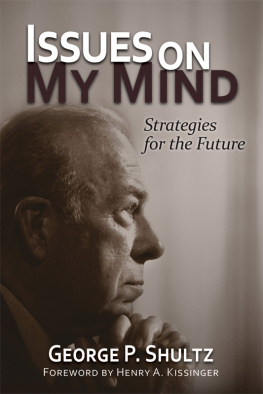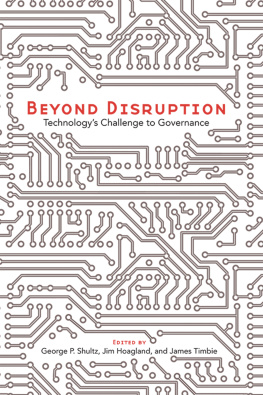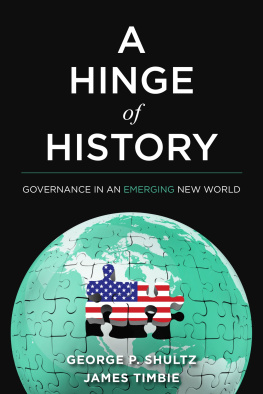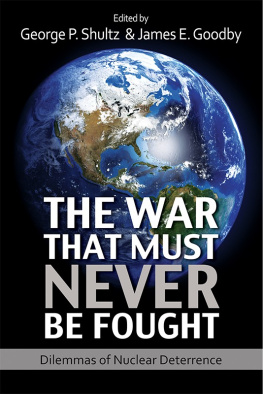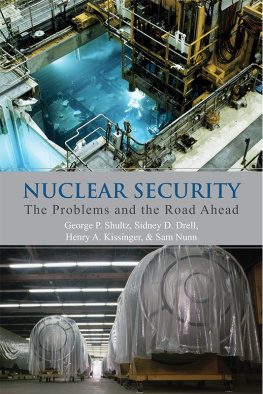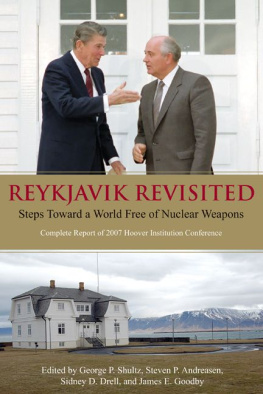CHAPTER ONE
Our Challenges
My days of public service, after two and a half years as a US Marine in the Pacific during World War II, span three administration s those of Eisenhower, Nixon, and Reaga n and include four cabinet positions: secretary of labor, director of the Office of Management and Budget, secretary of the treasury, and secretary of state. Th roughout my years in government, and continuing through my careers in business and academia, a number of vital issues have been persistently on my mind.
Th is book contains my thoughts about six of these central issues, including comments I have made about them in speeches and publications over the past half century.
Th e result is basically a how-to book. It offers thoughts on how to: do a better job of governance; get our economy back on track; take full advantage of current prospects for twin revolutions in the field of energy; take on the debilitating problems associated with addictive drugs; conduct an energetic, professional, and tough-minded diplomacy; and confront the security issues posed by nuclear weapons.
We now face these difficult issues at a particularly challenging time. We have moved from a period when we in the United States took the lead role in the construction of a global economic and security commons to a world that is awash in change. We must identify constructive ways to influence the changing world for the well-being of the United States as well as for the benefit of all.
An Economic and Security Commons
As World War II was drawing to a close, a group of gifted and creative people from the United States, Great Britain, and other Allied countries gathered to plan for the future. Th ey reflected on the events of the first part of the twentieth century: two world wars, the first ended with a vindictive treaty and both with immense casualties (around 70 million people, civilian and military, in World War II alone), the Holocaust, and the Great Depression with the accompanying explosion of protectionism and competitive currency devaluations. Seeing this, and recognizing that the Soviet Union was an aggressive and dangerous adversary, this group realized the urgent need to construct a different kind of world.
It was in this environment that there emerged the concept of containment, the establishment of NATO, and the creation of the General Agreement on Tariffs and Trade (GATT) with its rounds of agreements lowering barriers to trade. In addition, the International Monetary Fund (IMF) was established to deal with currency issues and the International Bank for Reconstruction and Development (now the World Bank) was founded to deal with the development needs of devastated countries and, subsequently, the needs of countries with low per-capita incomes. Th is era also led to the formation of the United Nations to help preserve the peace and support the emergence of the European Community.
Th ese developments resulted in what could be called a global economic and security commons in which the United States took the lead and its allie s and, eventually, its reconstructed adversarie s played strong roles. Th e creative contributions to these efforts by the Truman and Eisenhower administrations extended, with a few dips and valleys, through the end of the Cold War in the 1990s, at which time Russia began to take part in the global economy. China and Russia have now become members of the World Trade Organization. I was proud to play a part in this process as a cabinet member in the Nixon and Reagan administrations.
Th e establishment and strengthening of the global economic and security commons has been beneficial for the United States. Th ese decades have also seen unprecedented improvement in the human condition on a global scale. Poverty has been reduced and many people enjoy better health and longer lives, due in some considerable part to breathtaking biological research and the development of pharmaceutical products and innovative medical procedures, many of them emanating from the United States.
But now we are once again living in an age of remarkable changes of enormous proportions that affect every part of the globe. Th is age calls for a renewed effort to understand these developments and to recreate a global economic and security commons that will benefit us as well as the rest of the world. Th e changes we face are real and the risks of a chaotic world are high. Serious progress must be made in addressing each of the issues discussed in the chapters that follow. Th e United States must once again demonstrate its capability and willingness to take the lead.
A World Awash in Change
Primary among these dramatic changes is demography , which has recently undergone stunning shifts. In almost every developed country, fertility is far below the replacement level, longevity is rising, and the labor force is shrinking in proportion to the total population. Th ese developments inevitably affect outlook and capability. In many countries, such as Germany and Japan, populations are declining. Russia has a demographic catastrophe on its hands, with low fertility, longevity for men at around sixty years, and a declining population. South Korea, Japan, and other relatively developed countries in Asia exhibit demographics similar to those of many European nations. Of these countries, Japan now has the most rapidly aging population.
In some ways, China has the most interesting demography. With its one-child policy, fertility began falling rapidly about thirty years ago, so for a quarter century China had a growing labor pool and a decreasing number of people that labor pool had to suppor t call it a demographic dividend. But soon that picture will shift abruptly, almost like flipping a switch. Th e labor pool will start to decline and the number of older people whom the labor force must support will start rising rapidly.
Th e situation is quite different in other parts of the world such as the Middle East and North Africa, where fertility has declined moderately but is still relatively high, so the growing populations are primarily young. In all too many cases, however, these societies are organized in such a way that many of their youth have little or nothing to do.
Added to this demographic picture is the deep and still underappreciated impact of the information and communications revolution that allows people in nearly every corner of the world to be informed, to communicate, and to organize. Th is development profoundly changes the manner of governance because it sharply reduces the distance between those in power and those being governed. Th is shift may cause countries with representative-style governments to struggle, but these leaders are accustomed to listening to their citizens. Autocratic governments that have been in place for decades, however, will become increasingly vulnerable.
In much of the Middle East and North Africa, there is now a toxic mix: many young people are without work and, because of the information and communications revolution, they are becoming ever more aware of their plight in comparison to the lives of their counterparts in other areas of the world. Remember that the movement we might call the Arab Awakening was sparked by one entrepreneur in Tunisia who simply wanted to create a business selling fruits and vegetables. As the regimes corrupt police officers to whom he refused to pay bribes squashed him, he asked, How do you expect me to make a living? A fundamental lesson from this incident is that the future stability of these societies will depend more on economies that can put people to work than on the barrel of a gun, because work links people to reality and can provide them with positive incentives, confidence in the future, and the dignity that comes from knowing they have earned what they have been paid.

